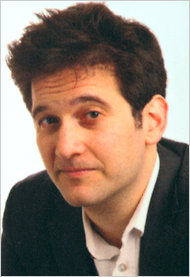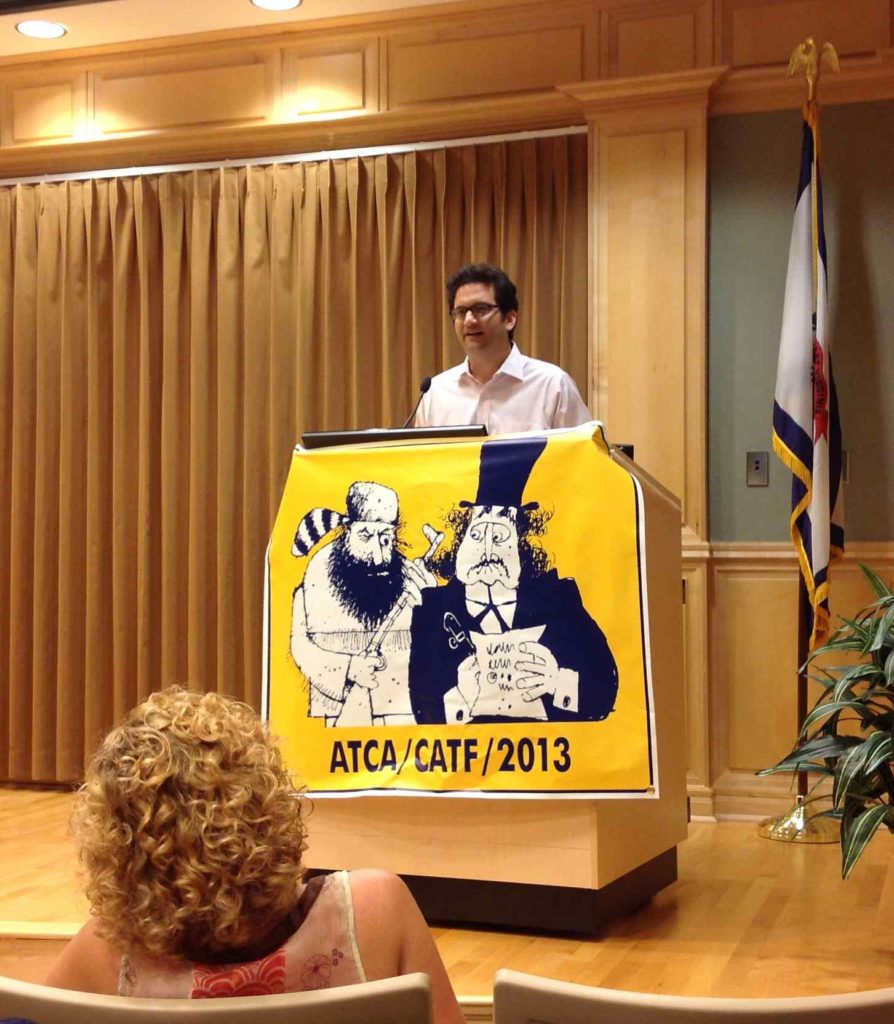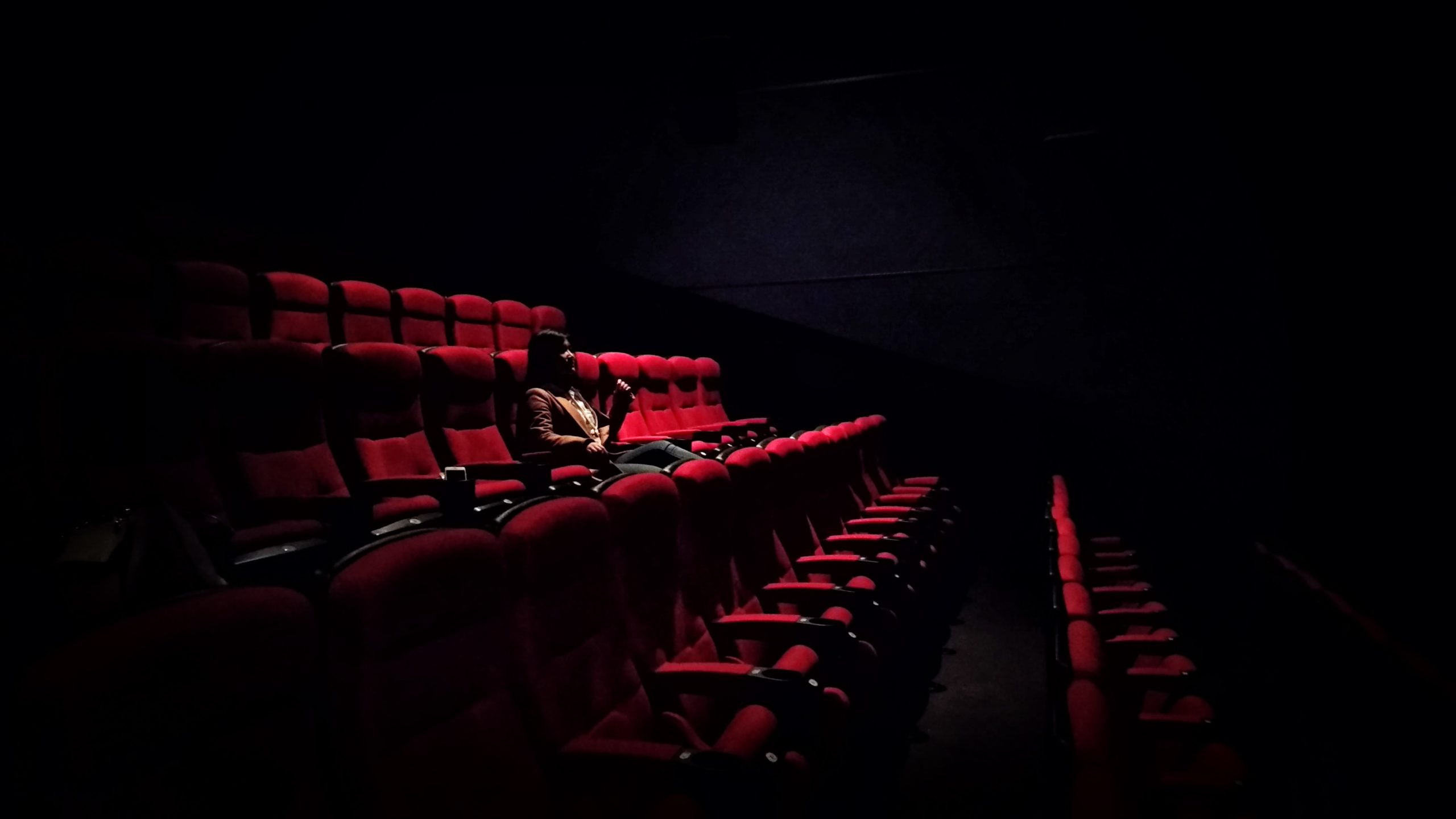Jason Zinoman, Perspectives in Criticism

You had to be there, of course — which was one of his themes. This is all about live theater, after all, and in performance, Jason’s talk was animated and funny, full of impromptu sidebars. But for the basic speech, with its mix of autobiography and challenge …
Jason Zinoman
I am extremely honored to be here at the American Theatre Critics Association conference and was very flattered to be asked. Critics are not sentimental types, but I believe that you all do important, noble work that is much harder than it looks.
It’s also a treat to come back to the area where I grew up. In New York, I am known as Jason Zinoman. But here, I am Joy’s son. For those who don’t know, my mother, Joy Zinoman, founded the Studio Theater in Washington. She started its acting conservatory the year I was born. The Studio has grown into one of the premiere theaters in the country, even though it’s never won the Regional Theater Tony, which I recently discovered is chosen by you people. So with perfect objectivity, I’d like to say this: I hope all your mothers are unjustly overlooked… . I kid!

It’s very easy to believe that your childhood is ordinary, because it’s the only one you have. Only now looking back, I realize that growing up the kid of an artistic director was not normal. In my house, figuring out the best way to get a performance out of an actor was dinner conversation. Critics, from what I could tell as a kid, were pure, unadulterated evil. And the most respected person in the world was a set designer. His name is Russell Metheny.
He designed most of the plays my mother directed. He was my godfather. And he was spoken about in my family with the admiration usually afforded a reclusive and brilliant cult leader. Others in theater were talented, did good work. But in my house Russell was the theater’s resident genius. Now I should emphasize that this is from the subjective perspective of a child interpreting the even more subjective perspective of my mother. Theater people, as you might have heard, are known to exaggerate and mythologize. But if there’s one thing I have learned from the American theater, it’s that the stories we tell ourselves about the truth are sometimes as important as the truth. It’s a theme explored by everyone from Eugene O’Neill to Book of Mormon.
The narrative I heard as a child about Russell Metheny was that he was the least credentialed of artists. He didn’t go to whatever designer school you were supposed to go to. He didn’t work at whatever theater was the right training ground. He wasn’t going to blow you away at a job interview or schmooze spectacularly at a New York cocktail party. He wasn’t the most famous set designer. He was just the best. His ideas were unexpected, daring and inspired. His commitment to them was stubborn. And he focused ferociously on the work. He was always working. He didn’t worry about press and career bullshit.
It didn’t matter if he was designing for a big or small theater, good or bad production. He took pride in his own high standards and that is what made him respected. Also: His greatness was not merely in the airy world of art and ideas. He was skilled and focused on the unglamorous but necessary work of problem solving, which is what artists and critics need to do. This I occasionally overheard in conversations about shows but also in other things.
One of my earliest memories was being in a car with my mother and Russell and I asked the question that no parent wants to hear: What is sex? I was maybe 6 or 7, say. I’m not sure where I heard the word but my parents were not the types to censor themselves in front of kids. But to this question, my mother punted. Silence. Russell filled the space, saying: Sex is whether someone is a boy or a girl. And that was the end of the conversation. That, you see, is problem solving.
When the Studio built its new home, they had an architect who had all the degrees an architect should have. And then Russell worked on it too. He did just as much if not more work. This was the story my family told. One of the theaters is called the Metheny. It’s one of the few if the only in the US named after a set designer.
So the reason I bring all this up is that I want to talk about the tricky question of the authority of the theater critic. In other words, why in the world should anyone listen to what we have to say? We didn’t get a degree in theater criticism. No one’s born a theater critic. When artists get a bad review, what do they say: What an idiot. It’s just one person’s opinion. And they are right, about at least one of those two things.
The authority of the theater critic is a particularly important question because right now, it’s in a state of flux. Over the course of my career, the economic model for the professional critic has fallen apart. That’s the real crisis and also opportunity facing us. Anyone who tells you that the distinct crisis of criticism today is about the sorry state of reviewers or consumer guide thumbs up, thumbs down reviewing or word counts or mean-spirited opinions doesn’t know their history. Those complaints have been leveled for many, many years and those issues are old. What’s changing now is more fundamental.
When I meet someone today who tells me he or she has been a theater critic for years, my first thought is you poor miserable bastard. My second is respect because I know that someone is passionate about what they do. Theater critic is the only job I can think of where if you stick at it there is a good chance you will become broke AND hated.
If you’re a poet, you will likely be broke. But who can hate a poet? Tell someone you are a professional assassin at a cocktail party and they might dislike you, but hey, it’s a good living.
You may say: How do I know that critics are hated? I’ve been on other end. A few years ago I wrote a book, took me the years of struggle. It was reviewed by my paper the NYT and the critic, who is from Boston, wrote a mixed review, which as you know means it was good and bad. There were even parts of it that my publisher used in ad quotes. So objectively, it was an ok review. Didn’t feel like that. It felt worse.
When I read the review for the first time online, my first thought was this: I am going to find where this critic lives. Then I will burn his house down. And if his family dies in the flames, well, so be it. Remember: this was a mixed review. And I am a professional critic for the NYT. I know his deadlines. I’ve written much more harsh reviews. I know that writing that the book’s problem is it has no connective tissue a few graphs before describing precisely what that connective tissue is is the kind of failure of logic that we all sometimes make. I could go on.
Point is: When you work for a long time on something and someone takes a few days to say something negative, your response can be understandably emotional. Years have passed. I have reconsidered my thoughts about him burning to a crisp and what I now think is this: I hope his family survives. And maybe they’ll find a good man to replace him, who likes my book.
If you want to be a critic, you need to understand there are people out there who think crazy thoughts like this about you. You need to be OK with that. To put another way, to be a critic, you need to be able to empathize with Willy Loman. But you can’t be Willy Loman – not in the sense that you take pride in being well-liked.
Ultimately, our responsibility is not to the emotional well being of a specific artist. Our responsibility is to the reader, the art form and our work. In so doing, I believe, we pay the artist respect. Our honesty and standards are an argument that the art they make matters.
Traditionally, our authority is derived from the outlets where we work. But if the outlet is where our authority comes from, we are depending on sinking ships. It’s not just that papers are closing and shrinking. It’s that technology has changed the way people read our reviews so as to distance us from association with where we write. My readers don’t all pick up the NYT and see me a few sections away from a deeply reported story on Syria. They find me on social media or an aggregation site after a snarky comment about Sharknado.
Technology has also changed the voice of the critic. Traditionally, the critic has been seen as an inaccessible, distant voice of God tossing down his opinion from the mountaintop. Today, we tweet. We answer reader questions. On our reviews, people respond immediately in comments. The review is tip-toeing from a monologue to a dialogue. The inaccessible God is dead.
So is this a disaster? Not at all. Here’s the truth: The traditional sources of authority –- the institution, the voice of God — were always flawed. We all know that Harvard is an excellent school and it’s an accomplishment if you get in. But we also know that a lot of idiots went to Harvard. And a lot of smart people dropped out. Some great actors went to Juilliard. Others had no training, and they can be better. The voice of God was also a fiction, even a crutch. Aiming for objectivity is a very worthy goal. None of us reach it. And the persona of the all-knowing wise thrower of thunderbolts is not only a fake. It’s often boring. We shouldn’t be boring.
Exposing the flaws of institutional basis for authority and the voice of God should actually liberate critics. More than any other part of the paper, criticism is fueled by a specific voice. We are better prepared than most journalists to handle and exploit this new state of affairs. We now have the rise of platforms that promote individual writers, like Twitter or Facebook. We are more likely to be free agents now, which can be scary, but can also, in my experience, be a good thing.
I was initially skeptical of Twitter. I was asked to jump in by my editor when I started the comedy column at the NYT. Now I’m addicted for reasons that are shallow and frivolous but also some that are substantial. Twitter has made me much more engaged with other critics, readers, even artists. Criticism requires distance from your subject. At the same time, one of the jobs of the critic is to try to figure out what an artist’s intention is. Which is harder from a distance. It’s a Catch-22. One thing that helps I find is reporting, but another is following social media. It’s transparent. There’s distance but the start of a dialogue. In the new world, we should embrace these dialogues. Not all of them. Some we should avoid. But engaging can make us smarter and better at our jobs. Through debate, you better learn what you actually think. It can lead to more nuance in an argument. Obviously you need to do the hard work of thinking through your review before you write it, but there’s nothing wrong with refining it, changing your mind, airing this out.
All these trends kill the old kind of authority. They make us less distant and intimidating and more human to the outside world. These are things to capitalize on, but it means we need to tell a new story about our authority. I propose we take a note from my godfather. Our jobs have become as precarious as artists and I think we need to start telling our narratives the same way they do. We are journalists, not philosopher Gods. We should be the first ones to call bullshit when confronted by authority by credentials. It’s our job to review what’s onstage, not what is in the bios of the program.
To be a good critic, you need to hustle and be curious and scrap and think harder in a short period of time than anyone else about these plays. You need to be stubborn in your convictions and firm in the idea that the crowd is not always right. But also willing to rethink things, which is what we sometimes do during a show. Our credentials derive from our work. Writing schools can be helpful, but I don’t believe a critic has any skills you can buy. You need to do it to get better. Our main credential and most important duty, especially these days of high ticket prices and shrinking staffs, is to be there, to go to the theaters that you’re covering. Some people are better suited to criticism than others, but anyone who truly loves doing it, the actual doing it, and is committed to their craft, can be great. I believe that.
From our work will come reputation. Reputation rises and falls. It isn’t created or destroyed with a review. In fact, if you haven’t thought you lost your reputation a few times you are probably doing something wrong. But the longer you work, the more often you are there in the theater, being there, your reputation fluctuates less. The Shakespeare play that speaks best to reputation is Othello. I want to quote from it.
Cassio:
Reputation, reputation, reputation! Oh, I have lost my reputation! I have lost the immortal part of myself, and what remains is bestial. My reputation, Iago, my reputation!
Iago
As I am an honest man, I thought you had received some bodily wound. There is more sense in that than in reputation. Reputation is an idle and most false imposition, oft got without merit and lost without deserving.
Here is another dialogue, a debate, we can learn from. Cassio is right that reputation matters. Iago is right you can gain reputation without merit. He of all people should know. But they are both a bit overly dramatic. As people in the theater tend to be. I see the reliability of reputation somewhere in between. In this job, reputation grows from diligent, consistent, responsible work and a willingness to adjust, change with the times and problem solve. It is often idle and false. But in the long term, I trust reputation.
I want to end on an optimistic note. It’s important to note that because of the internet, which has destroyed the fundamental economic model we depended on, interest in criticism has grown, not shrunk; that the places to read it are a click away and are greater than ever. More people are engaged in debates. The potential for a writer to reach an audience larger than their circle has never been greater.
Of all the kinds of critics, theater critics are best positioned to come out of this tumultuous period in the media successful. That’s because theater is a local art form. Film critic jobs in national alt weekly chains can be eliminated because where you live has no impact on your ability to cover Pacific Rim — unless of course you live in a world of robots and monsters. If you review the Signature Theater, you need to be in Virginia.
Informed theater criticism is a scarce resource with a growing audience. In economic terms, the supply is small and demand is high. So while the fundamentals of the economic model are shaky, the fundamentals underneath the fundamentals are actually strong.
Moreover, theater criticism is vital and irreplaceable in a way that other criticism is not. A century from now, a 23 year-old can consume every episode of Breaking Bad and write something more insightful about Bryan Cranston’s performance than anything written by television critics today. But if you don’t see Bryan Cranston play LBJ when he does it at ART in the Fall, you never will. We will learn about that production from the critics who go to Cambridge, sit in a room with Bryan Cranston and then go home and write about it. The liveness of theater makes the experience of being a theater critic different than the experience of being a movie or TV critic.
Journalism, it’s said, is the first draft of history. But in one vital way, theater criticism is the last one as well.





Sorry, the comment form is closed at this time.